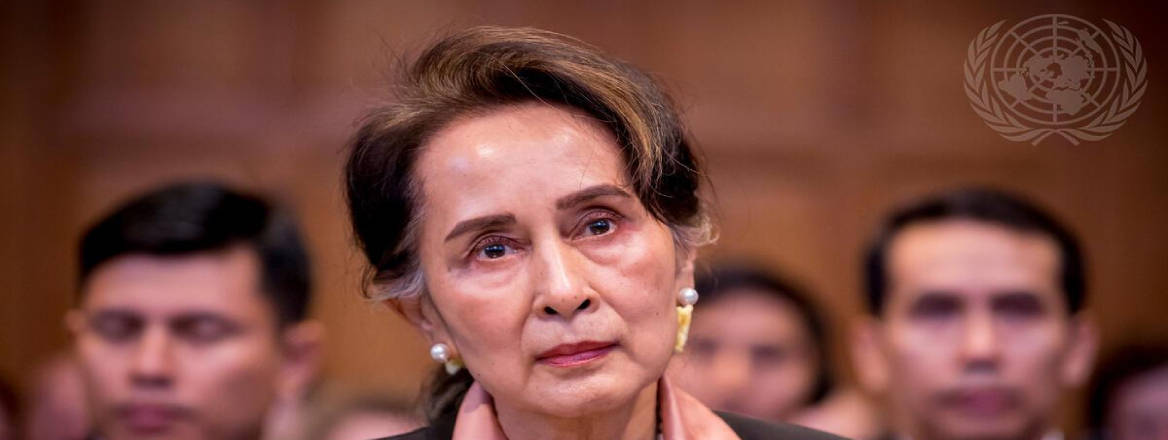Myanmar's Military Coup: International Reactions
The UN Security Council is meeting today to discuss the military coup in Myanmar. There is plenty of condemnation from Western countries, but more nuanced reactions from Myanmar’s immediate neighbours.
In the early hours of 1 February, leading figures from Myanmar’s government and the ruling National League for Democracy (NLD) party, including State Counsellor Aung San Suu Kyi and President Win Myint, were detained by Myanmar’s military, the Tatmadaw.
This comes after the Tatmadaw, which held power directly until 2011 and through a proxy political party until 2015, contested the results of Myanmar’s November 2020 general elections, which the NLD won by a crushing majority. The country’s election commission, which the military accused of having ‘neglected to ensure free, fair and transparent election[s]’, had rejected the military’s claims of voting irregularities.
Tensions have escalated in recent days after the military threatened to ‘take action’ and refused to rule out a coup if the election dispute was not resolved. The military’s seizure of power reportedly occurred after the NLD did not agree to its demand of postponing parliament, due to convene on 1 February, until the election results were investigated. Following the installation of Myint Swe, the vice president and a former general, as acting president, the military declared a one-year state of emergency and announced that it would reconstitute the election commission, hold elections and transfer power to the winning party.
These claims will be received with scepticism. Even in the last decade, when Myanmar was ostensibly on a path towards democracy, the Tatmadaw controlled key levers of power, including the defence, domestic and border affairs portfolios. Moreover, as per the constitution it drafted in 2008 to secure its political influence, the military reserved 25% of all parliamentary seats for itself, thus exercising veto power over any constitutional amendments and effectively creating a hybrid system of governance.
In spite of Aung San Suu Kyi’s fall from international grace due to her reluctance to condemn the military’s violent campaign against the Rohingya Muslims in Rakhine State and her defence of a major humanitarian disaster, many governments and international institutions have been quick to criticise the military’s actions. US President Joe Biden stated that the US ‘removed sanctions on Burma…based on progress toward democracy’ and that ‘the reversal of that progress will necessitate an immediate review’. UK Prime Minister Boris Johnson called for the Tatmadaw to ‘respect the rule of law and human rights, and release those unlawfully detained’ and for the reconvening of parliament. The EU, its member states and UN Secretary-General Antonio Guterres made similar criticisms.
India is Circumspect; Bangladesh Remains Expectant
Among Myanmar’s neighbours in the region, however, the reactions were more measured. India released a statement expressing concern and reiterating its support for Myanmar’s democratic transition. However, New Delhi will likely be cautious of overtly criticising the military owing to its deepening security relationship with the Tatmadaw and cooperation on counterinsurgency and border management along its troubled north-eastern border, which included a three-week long coordinated operation in May 2019. A joint visit in October 2020 to Myanmar by India’s foreign secretary and chief of army staff reflected the importance of security ties to the bilateral relationship. After the visit India gave Myanmar its first submarine.
Statements made by former Indian officials suggest that New Delhi will likely adopt a pragmatic approach to its relationship with Myanmar, regardless of who is in power. Even while Myanmar was ruled by the military government until 2011, India supported the process of democratisation while continuing to engage with the government and opposed the imposition of sanctions by the US and EU. Given India’s ongoing tensions with China, and broader Sino-Indian strategic competition in South Asia, it will be concerned that the potential diplomatic isolation of Myanmar might work in Beijing’s favour.
In addition to geopolitical concerns, India has economic interests in Myanmar. Myanmar serves an important function for India as the only ASEAN member that it shares a land border with, making it an important feature in its ‘Act East’ policy, which is intended to expand India’s relationships with Southeast and East Asian countries. Myanmar is pivotal to two major projects under this policy, the India–Myanmar–Thailand trilateral highway and the Kaladan Multi-Modal Transit Transport Project, which includes the development of a deep-water port at Sittwe.
While the Indian government has not come out strongly against the Tatmadaw’s role in the Rohingya crisis, for Bangladesh, this is currently the most important issue in its relationship with Myanmar. With Bangladesh hosting nearly one million Rohingya refugees, Dhaka has been eager to achieve a resolution that allows for the voluntary repatriation of the community. Although Bangladesh’s foreign minister noted that they expect the repatriation agreement signed with Myanmar to be followed regardless of who is in power, the seizure of power in Myanmar is likely to complicate an already fraught process, especially as General Min Aung Hlaing, Commander-in-Chief of the Tatmadaw, has been sanctioned by the US and the UK for human rights abuses against the Rohingya community.
China Sees This as a ‘Reshuffle’
China’s reaction has been largely predictable. The foreign ministry spokesperson ‘noted’ the situation in Myanmar and hoped that ‘all parties in Myanmar will properly handle their differences under the constitution and legal framework to maintain political and social stability’. Today, following news of the UN Security Council meeting, the foreign ministry spokesperson noted that any international action should help political and social stability in Myanmar and avoid intensifying conflict.
As Chinese foreign ministry spokesperson Wang Wenbin noted, China is a friendly neighbour to Myanmar. The carefully cultivated ties with Myanmar’s government have further facilitated China’s deepening relationship with another ASEAN member state, offering material support and cover from international pressure over the situation in the Rakhine State within the UN Security Council. President Xi Jinping’s first overseas trip in 2020 was to Myanmar and China is reportedly the second-largest investor in Myanmar after Singapore. Nevertheless, there has been a noticeable divergence in Chinese press coverage on the situation.
Xinhua’s English language version ran an understated article on the coup titled ‘Major Cabinet Reshuffle Announced in Myanmar’. China Daily’s English language version had, it should be noted, already highlighted fears over a possible coup days earlier.
Chinese-language media was a different matter altogether. Chinese press caried stories on the military taking control of the country after concerns over electoral irregularities, though the China Daily did use the term ‘government reshuffle’. Other stories in the China Daily noted Burmese political figures in the country were arrested and Chinese carrier flights were cancelled, along with all other flights in and out of the country. Today, it reported that the World Bank was concerned that the political instability would jeopardise the country’s development. Xinhua noted that as recently as 29 January, Wang Yi, China’s foreign minister, had held talks with Aung San Suu Kyi, expressing hope for China–Myanmar cooperation. According to foreign minister Wang Yi, their shared future was based around Myanmar’s role in the Belt and Road Initiative. But also important to China is Myanmar’s current position as coordinator for China–ASEAN relations in 2021 and co-chair of the Lancang–Mekong Cooperation, a forum to manage the Mekong’s waterflow.
The split in coverage in Chinese press highlights the strategic importance of Myanmar to China, politically and economically. The situation is clearly of importance to domestic Chinese stakeholders that have invested in the country over the years. To foreign audiences, however, there seems to be a downplaying of the situation and a sense of detachment, possibly given the current wariness among some foreign countries over China’s search for influence in the region.
It remains to be seen how its relationship with the military government will evolve over the coming year, particularly given its complex involvement in Myanmar’s internal peace process. For now, however, China will likely be waiting and watching.
ASEAN Divided
ASEAN’s current chair, Brunei, called for ‘dialogue among parties, reconciliation and the return to normalcy’. Expect little to be done as ASEAN member states are split in their reactions. Singapore, Malaysia and Indonesia expressed concern, while Thailand, Cambodia, and the Philippines noted that this was Myanmar’s ‘internal affair’.
ASEAN tends to rule out punitive measures like sanctions against its member states. Other avenues do exist. ASEAN has previously placed significant pressure on the military government to hold democratic elections, but did so after it was invited and encouraged by the UN Security Council and international community to play an active role in peace and security.
The ability to apply that pressure to ASEAN now comes from the UK, which holds the presidency of the UN Security Council for February, and its ambassador, Barbara Woodward. The world now looks to ASEAN to see whether it will step up to the plate.
The views expressed in this Commentary are the author's, and do not represent those of RUSI or any other institution.
WRITTEN BY
Veerle Nouwens
External Author | Former RUSI Senior Research Fellow, Asia-Pacific
Aaditya Dave
Former Research Analyst, South Asia



